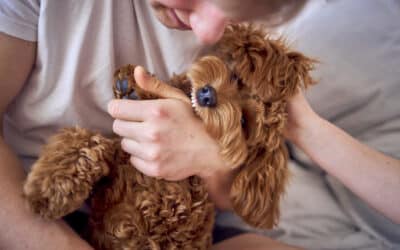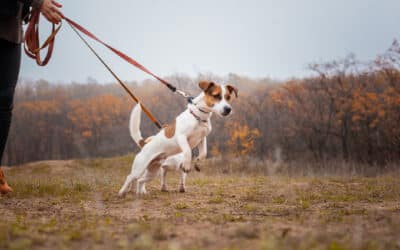When you bring your brand new puppy home, your entire life immediately begins to revolve around them. I mean, they are adorable — how could it not?
You might take a day, or two, or even longer off work to be with your little one 24/7, just to make sure everything’s okay. And if you’re raising a new pup in 2020, you’ve likely got all the time in the world to spend with your new best friend.
They’ll follow you around from room to room, hang out while you’re cooking dinner, and even join you in the bathroom while you have a shower! And if you leave the room, even just for a few seconds, they’re insanely excited to see you again.
It might seem cute (and it is cute, for sure), but leaving these behaviours unchecked can lead to things that might not become apparent until much later: unwanted attachment behaviours, and in some cases, even separation anxiety.
What is separation anxiety?
Separation anxiety in dogs (and puppies) is a condition where a dog exhibits destructive or disruptive behaviour as a result of stress. It’s a sad, but common reality for many dogs — even if we all love and care greatly for them.
What’s more common, however, are behaviours that look like, or can be a precursor to separation anxiety. Common causes are boredom, an unhealthy attachment to their human, or even too many adrenaline-inducing games. And, most importantly, not training your dog to stay at home alone.
What are the signs of separation anxiety in puppies?
Separation anxiety, or anxious behaviours, can take many forms. The most common of them being:
- Excessive barking or howling when left alone (in another room, or when they’re home alone)
- Eliminating inside, even when they’re house-trained
- Destructive behaviour (digging, destroying furniture or other items)
- Whining, pacing and crying as you leave or are preparing to leave
That being said, if your dog is showing these behaviours, it doesn’t strictly mean they have separation anxiety — these are all behaviours displayed by dogs who don’t yet know how to be alone. And also, sometimes things just mysteriously explode. It happens.
The importance of prevention
We all know that prevention is more effective than a cure. And boy, this couldn’t be more true with dogs. Helping your puppy learn how to be alone (and even enjoy it) from when they’re young is the key to avoiding separation anxiety as they grow up.
Also, let’s not forget about you — the very real person with a very real life outside of having a dog. It’s also important in making sure you have some balance in your life too. You should be able to live your life with your dog, not live your life around your dog.
So where should you start?
There are plenty of simple ways you can help your puppy feel more comfortable being alone — including exercise, teaching independence, crate training, and desensitizing the dog from particular triggers.
Check out this webinar by our CEO, Noora, or jump straight into a free trial of our comprehensive puppy training program (there’s a whole section on teaching your puppy to be alone!)



